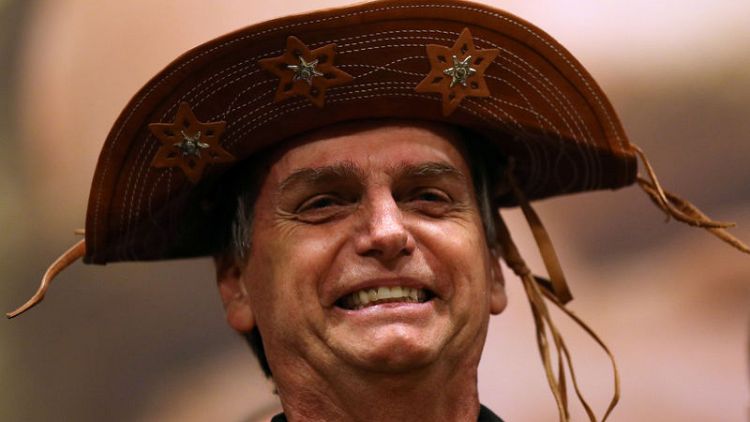By Gabriel Stargardter
RIO DE JANEIRO (Reuters) - Shortly after describing the media as "trash," Brazilian far-right presidential front-runner Jair Bolsonaro turned around and called journalists "friends" and pledged to defend a free press, as he courts centrist voters ahead of a run-off election.
Bolsonaro, who survived a knife attack during a campaign rally on Sept. 6, rode a wave of anger over years of graft, rising violence and a weak economy to take a strong lead in last Sunday's first-round vote, winning 46 percent of ballots. Many expect him to beat leftist Fernando Haddad, of the Workers Party, in the Oct. 28 run-off.
Despite his strong showing at the ballot box, polls show Bolsonaro is disliked by large swaths of the electorate. During his nearly three decades as a federal congressman, the former army captain alienated many voters with violent, misogynist and homophobic comments.
Those concerns have increased since last weekend's election due to a growing list of attacks, allegedly by his supporters, against political opponents, and by his antipathy toward the press, which he labelled "trash" in a Twitter post on Thursday.
Shortly after the tweet, Bolsonaro struck a more conciliatory tone, seeking to appeal to centrist voters and denying he was from the "extreme right." He also pledged to respect the freedom of a press he has regularly criticized as treating him unfairly, while denouncing acts of violence that critics say have been committed in his name.
"Members of the press, or maybe I should say 'friends,' ... we're going to guarantee the freedom of the press. We're not going to have any of that business of media control," he told a room full of reporters and party supporters in Rio de Janeiro in his first public news conference since the vote.
"We want for you to really be independent, and be responsible in everything that you write," he added.
But when it was the turn of a female reporter from Brazil's respected Folha de S.Paulo newspaper to ask a question, she was hissed and booed by Bolsonaro's supporters, prompting Social Liberal Party leader Gustavo Bebianno to wade in and remind them of their commitment to a free press.
According to the Brazilian Association of Investigative Journalism (Abraji), there have been 130 cases of attacks against journalists related to politics and the election this year.
On Thursday, a car transporting Bolsonaro's opponent in the presidential race was blocked by a pick-up truck in Brasília, according to Haddad's communication staff. The unidentified occupants of that vehicle shouted epithets against Haddad and members of the Catholic church, which the candidate had just visited, Haddad's aides said.
In an interview broadcast via social media on Friday, Haddad criticized Bolsonaro's campaign for "fostering a culture of violence." Haddad said a man had been identified in connection with the incident and is being monitored by the federal police.
Bolsonaro has increasingly eschewed Brazil's mainstream media in recent weeks, speaking directly to his supporters via Facebook Live, or through cozy interviews with friendly TV networks that echo similar communication strategies used by U.S. President Donald Trump.
Bolsonaro on Thursday reiterated his admiration for Trump. But he said he had not met with the U.S. leader's former adviser Steve Bannon, who appeared with Bolsonaro's son, Eduardo, during the campaign.
Regarding the aggressions allegedly carried out by his fans, Bolsonaro said he had zero tolerance.
"If by any chance it was somebody who voted for me, I reject that sort of vote. They committed a crime, they'll have to pay," he said. "My people are not disseminating hate."
(Reporting by Gabriel Stargardter a and Pedro Fonseca in Rio de Janeiro. Additional reporting by Ana Mano in São Paulo; Editing by Dan Grebler)


